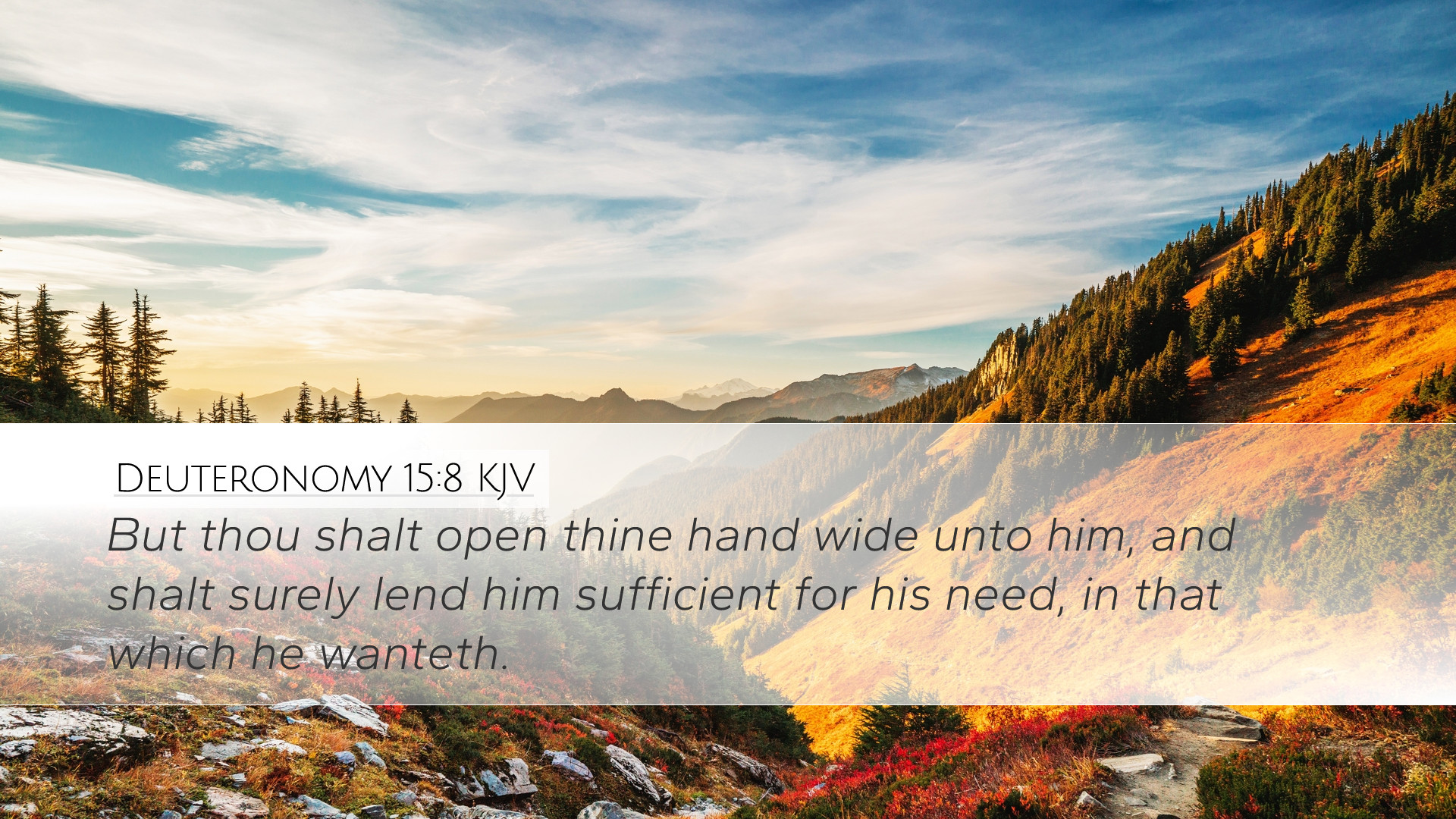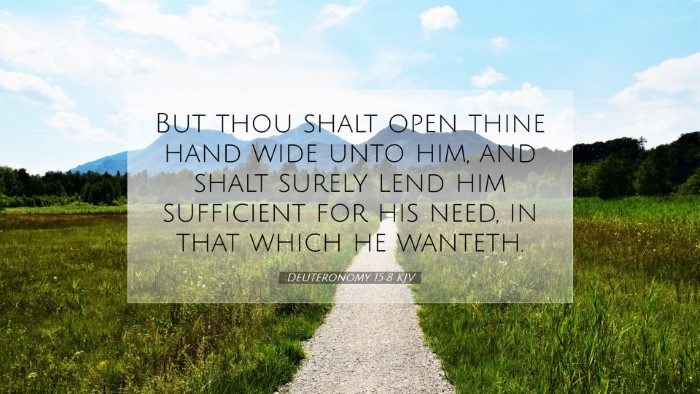Commentary on Deuteronomy 15:8
Verse Text: “But you shall open your hand wide to him, and willingly lend him sufficient for his need, whatever he needs.” (Deuteronomy 15:8, NKJV)
Introduction
This verse from Deuteronomy encapsulates the essence of generosity and compassion that is central to the Hebrew law. It speaks to the obligations of the Israelite community toward one another, especially those who find themselves in need. In exploring this passage, insights from various public domain commentaries provide a deeper understanding of its implications for personal and communal ethics.
Contextual Overview
Deuteronomy is often described as Moses' farewell address to the Israelites as they prepare to enter the Promised Land. In this context, the laws provided serve not only as divine instructions but also as a means to cultivate a just and compassionate society.
Historical Context
The commands outlined in Deuteronomy were meant to govern the social and economic life of the Israelites. The nation was to function as a community that reflected God's justice and mercy. The specific command in Deuteronomy 15:8 addresses the interconnectedness of community members and the responsibility to assist those in dire circumstances.
Exegesis of Deuteronomy 15:8
Matthew Henry’s Commentary highlights the moral obligation to assist the poor and needy, reflecting God’s own disposition towards mercy. Henry emphasizes the critical notion of 'opening the hand wide,' indicating not just a superficial assistance, but a generous and abundant lending that meets genuine needs. He notes that this reflects the larger biblical principle that those who are blessed by God are to be channels of blessing to others.
Albert Barnes additionally notes that the Hebrew term used for 'lend' is not limited to a temporary loan but encompasses the broader idea of providing help. He asserts that lending to the poor is an act of faith, underpinned by a reliance upon God’s provision and the understanding that material wealth is a stewardship responsibility. Barnes elaborates that true lending in this sense is devoid of oppressive terms, with a focus on alleviating need and fostering a spirit of community support.
Adam Clarke places particular emphasis on the willingness aspect of the verse. According to Clarke, God desires not just the action of lending, but the attitude of the heart. He posits that the spirit in which help is given is as crucial as the help itself, aligning with the New Testament teaching of giving cheerfully (2 Corinthians 9:7). This insight challenges the reader to reflect on their own motivations when offering assistance to others.
Theological Implications
The theological significance of Deuteronomy 15:8 extends beyond mere action; it presents a framework for understanding God's character and His expectations for His people.
1. Reflects God’s Generosity
At the core of this command is a reflection of God’s generous nature. Just as God has opened His hand to His people with abundant blessings, so too are they called to mirror this generosity. This reciprocal relationship between divine blessing and human responsibility reinforces the covenantal promise that God’s people will be conduits of His goodness.
2. Community and Mutual Responsibility
The call to lend reflects the communal nature of Israelite society. The health of the community relies on the well-being of each individual. When one suffers, it impacts the whole community. Thus, lending becomes a communal act, fostering bonds of unity and solidarity.
3. Ethical Living in God’s Kingdom
This verse also provides a framework for ethical living within God’s kingdom. The act of lending should be characterized by mercy and grace, illustrating the heart of God’s law as one that desires the welfare of all. This challenges both personal and corporate attitudes toward wealth, invoking questions about how resources are perceived and utilized in the body of believers.
Practical Applications
In modern application, Deuteronomy 15:8 invites pastors, theologians, students, and believers to consider how they approach issues of poverty, assistance, and community support.
- Generosity as a Lifestyle: This verse can encourage a culture of generosity within the church, pushing beyond charitable giving to a state of continual openness to support others.
- Holistic Care for the Needy: Pastors are urged to develop programs that not only provide financial help but also equip individuals with skills, knowledge, and resources for self-sustainability.
- Challenging Societal Norms: The call to "open your hand wide" stands in stark contrast to a consumer-driven culture. This passage encourages believers to question societal values and adopt practices centered on mutual care and support.
- Formulating Community Initiatives: Students and young leaders are inspired to initiate community groups or projects that address local needs, reflecting the biblical mandate of collective responsibility.
Conclusion
Deuteronomy 15:8 invites deep reflection on the character of God and the responsibilities of His people. As reflections of God’s generosity, believers are called to 'open wide' their hands to those in need, fostering a community rooted in compassion, support, and mutual care. The insights drawn from historical commentaries enrich our understanding and motivate us to embody these principles in everyday life.


